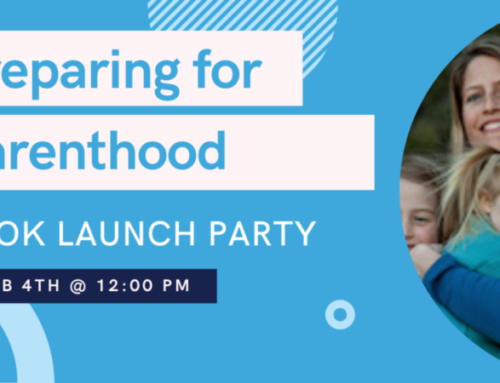Becoming a parent for the first time is completely life-changing. However, if you are open, and interested in entering parenthood well-equipped, it is not only possible to prepare for parenthood, it’s also highly recommended.
Preparing your heart and mind for parenthood means learning to accept relational changes, parental worries and excitements, evolving responsibilities, and unexpected surprises along the way. It also means having a real sense of humor, being willing to have your heart deeply opened, and getting ready to see everything you thought you knew turned upside-down.
What can you do to prepare for all that?
Consider the following 7 tips:
1. Secure a strong support network
If you are in a relationship, talk to each other extensively about how you can support one another in this huge life transition. And keep talking. Discuss your hopes and concerns. Find ways of staying connected to each other. Communication and deep connection lay important groundwork for navigating parenting with your partner.
If you are single, preparing for parenthood involves focusing on securing strong support from your friends and family members. Find groups of other single parents, and rally your friends and family around you.
Whether you are in relationship or not, you’ll need others who are willing and able to be available to share some of the many responsibilities parenting entails. Think about who you can call if you need a break, have challenges with nursing or feeding, or are struggling with your partner. Get people on board before your baby arrives.
2. Become a good student of parenting experts you admire
To get a grasp of how much change you can expect in your life, seek out readily-available information. Many soon-to-be parents read books, watch YouTube, or sit in on a few meetings with a parenting group. Ongoing prenatal classes can be a great way to assist you in preparing for parenthood, by building a network of other soon-to-be parents and providing a safe space to ask questions you may have.
It is also extremely helpful to talk to parents you know, especially parents of very young children. The parenting experience will evolve over time as you and your own children mature. Friends who have very young children can give you an honest account of their current experience. Listen to both the good and bad.
Real facts are really helpful.
- Consider how friends and family members relate the changes in their relationships with their partners, friends, and extended family members.
- Pay attention to how they address the needs of their children.
- Listen to how other parents navigate work, family, and personal pursuits.
- Draw on the wisdom of others regarding child-rearing, lifestyle changes, and the accompanying transitions.
3. Assess your willingness to put the needs of your child and family ahead of your own
Your children will require a vast amount of attention, care, and love. Being a parent can be the most exciting, enriching, and heart-opening experience you may ever have. At times, it can also be exhausting. If you’re ready, this life transition is worth the many sacrifices you will likely need to make. But, prepared or not, parenthood can be a difficult adjustment.
Your job, as an attentive parent, is to provide love and nurturance, and to meet your child’s needs consistently. Preparing for parenthood is an incredible gift, which includes accepting the challenge to constantly put someone else’s needs before your own.
4. Consider your own childhood
What do you remember about your own childhood and your experience of being parented? What was really good? What positive things would you like to pass along to your own children? What worried or frightened you? What things would you not like to pass along to your own children?
Venturing into parenting will likely bring up some emotions and thoughts about your childhood that should be addressed. These considerations may gently or strongly shape the way you raise your own children. In preparing for parenthood, challenging memories might arise, and it may be advisable to see a therapist for guidance. A therapist may help you to work through these issues before they become an issue in your own parenting. Seeking therapy can be a tremendous asset during any huge transition. A skilled therapist can help you prepare to enter parenthood consciously, responding to situations from a more aware place, rather than just reacting to them.
5. Investigate existing parenting philosophies
How you decide to parent may focus less on replicating or rejecting your own upbringing, and more on attempting to fulfill some kind of emotional purpose, intellectual hope, or spiritual tradition for your family.
How you focus your parenting energy is an outgrowth of the values, skills, and opportunities you would like to impart to your child. If you are consciously preparing for parenthood, this is an opportunity to be thoughtful, and to really plan for your hopes and dreams for your family.
6. Maintain reasonable, yet positive expectations. And have a sense of humor.
A large amount of change, work, joy, and disappointment comes with the parenting territory.
It is important to keep your expectations both reasonable and positive:
- Becoming a parent is a selfless undertaking. However, it is also filled with incredible joy and mind-bending love.
- Becoming a parent won’t save your partnership. In fact, it may put considerable strain on your partnership at times. However, it can be a place of deep growth for a couple.
- Becoming a parent will not, and should not, fulfill your own need to be loved. However, providing unconditional love for your child may fill your own heart in ways you never imagined possible.
- Becoming a parent practically requires a sense of humor. Humor can help in even the most trying of times. Nothing breaks up a tense situation like appropriate laughter.
7. Learn to relax, stay present, and be flexible
Practically speaking, rest is very important for effective coping and general well-being. If you are well-rested and in-tune with your body and emotions, you’ll find that you are less susceptible to the stresses that accompany the transition into parenting. Your mood will likely be more resilient and your responses more positive and gentle.
However, time to rest, meditate, or journal will be at a premium when children arrive. Teach yourself now many ways to wind down and manage stress so that it won’t be as difficult to accomplish later. In preparing for parenthood, take time to just breathe and stay present during both the challenging and joyful times in your life. Most importantly, know that the experience of parenting constantly changes over time. The more positive and flexible you can be through this constant change, the more likely you will be to experience the many moments of deep joy and love that parenting can involve.







Leave A Comment